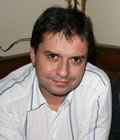Francesco Cesarini
Founder of Erlang Solutions and co-author of Erlang Programming
Erlang Solutions Ltd.

Francesco Cesarini is the founder and Technical Director of Erlang Solutions. He has used Erlang on a daily basis for almost 15 years,
starting as an intern at Ericsson’s computer science laboratory, the
birthplace of Erlang. He moved on to Ericsson’s Erlang training and
consulting arm working on the first release of OTP, applying it to
turnkey solutions and flagship telecom applications. In 1999, soon
after Erlang was released as open source, he founded Erlang Solutions, who have become the world leaders in Erlang based
consulting, contracting, training and systems development. Francesco
has worked in major Erlang based projects both within and outside
Ericsson, and as Technical Director, is currently leading the development and
consulting teams at Erlang Solutions. He is also the co-author of Practical Erlang
Programming, a book published by O’Reilly and still finds time to teach at Oxford University.
Erlang Programming on Amazon
Erlang Solutions Ltd.
Twitter: @FrancescoC
Erlang Programming on Amazon
Erlang Solutions Ltd.
Twitter: @FrancescoC

Francesco Cesarini is Giving the Following Talks
OTP, the Middleware for Concurrent Distributed Scalable Architectures
While Erlang is a powerful programming language used to build distributed, fault tolerant systems with requirements of high availability, these complex systems require middleware in the form of reusable libraries, release, debugging and maintenance tools together with design principles and patterns used to style your concurrency model and your architecture.
In this talk, Francesco will introduce the building blocks that form OTP, the defacto middleware that ships with the Erlang/OTP distribution. He will cover OTP’s design principles, describing how they provide software engineering guidelines that enable developers to structure systems in a scalable and fault tolerant way, without the need to reinvent the wheel.
Talk objectives: Introduce a powerful framework which reduces errors and helps developers achieve robustness and fault tollerance without affecting time to market.
Target audience: Erlang beginners and engineers and architects implementing scalable, server side systems.